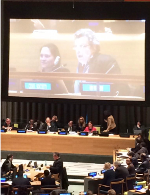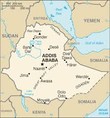Published on Thu, 2015-01-29 13:08
A broad international group of Civil Society Organizations following the Financing for Development (FfD) process prepare a response to the FFD Elements Paper. |
Published on Thu, 2015-01-29 13:08
You are cordially invited to a side-event by the Permanent Mission of Brazil to the UN, CIDSE and Social Watch on Thursday, January 29, 2015 in the UN Conference Building, New York. Dealing with responsibilities in a financing sustainable development context, this event seeks to generate discussion on conceptual challenges such as an evenhanded approach to the three pillars of sustainable development, adapting a framework like the Financing for Development process to the universal agenda of the Sustainable Development Goals without denaturalizing and decontextualizing it and how to incorporate important principles agreed at the UN Conference on Sustainable Development. |
Published on Wed, 2015-01-28 19:15
"The sovereign debt of today, particularly in developed countries that are highly indebted, is the results of the irresponsible indebtedness of the private sector that was bailed out with public monies" said Roberto Bissio, Social Watch Coordinator, at the first preparatory session of the Addis Ababa Conference on Financing for Development on January 28, 2015. Bissio therefore suggested that the conference should return to the analysis of EXTERNAL DEBT (including public and private debt) as more appropriate to identify vulnerabilities than the current reduction of the agenda to "sovereign debt". Further, the Social Watch representative called for the conference to address the link of finances with inequalities and with the transformation of unsustainable consumption and production patterns. Read his complete intervention below or see the video here or download here the pdf version. |
Published on Tue, 2015-01-27 10:40
An overwhelming majority of citizens in the 28-member European Union (EU) – which has been hamstrung by a spreading economic recession, a fall in oil prices and a decline of its common currency, the Euro – has expressed strong support for development cooperation and increased aid to developing nations. A new Eurobarometer survey to mark the beginning of the ‘European Year for Development,’released Monday, shows a significant increase in the number of people in favour of increasing international development aid. The survey reveals that most Europeans continue to “feel very positively about development and cooperation”. Additionally, the survey also indicates that 67 percent of respondents across Europe think development aid should be increased – a higher percentage than in recent years, despite the current economic situation in Europe. |
Published on Mon, 2015-01-26 08:08
The Third UN Conference on Financing for Development will take place in Addis Ababa in July 2015. The key question will be how to finance the Sustainable Development Goals. In September 2015 the UN will finalize the new global Sustainable Development Goals (SDGs). The political negotiations within the Open Working Group (OWG) have produced an ambitious catalogue of 17 main goals and numerous sub-goals, all of which focus equally on economic, social and environmental aspects of sustainable development. It is yet to be seen whether the goals put forward by the OWG will be watered down by the time the negotiations are over. Several countries have already announced their opposition to specific proposals. |








